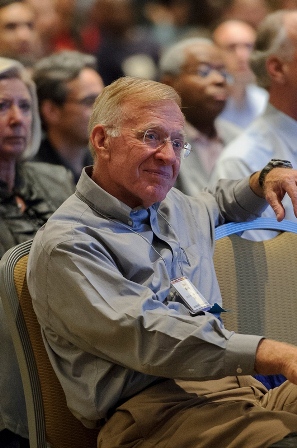David H. Walker, MD, chair of the Department of Pathology at the University of Texas Medical Branch in Galveston, formally assumed the presidency of ASTMH Wednesday at the society’s annual meeting in Atlanta. Walker’s career has included a focus on tick-borne diseases, such as Rocky Mountain spotted fever and human ehrlichiosis. He has served as president of the American Society for Rickettsiology and, in the 1990s, was a technical adviser on spotted fever at the Inner Mongolia Anti-epidemic Station in the People’s Republic of China.
Matthew Davis talked with Dr. Walker about his attraction to tropical medicine and priorities for his presidency.

How does someone trained as a pathologist end up focusing on tropical medicine?
In medical school, I took a course in tropical medicine as an elective, and it intrigued me. And when I decided to do a residency in pathology, I thought I would look for ways to combine it with tropical medicine. But about a year into my pathology residency in Boston I thought, “I made a big mistake because there are no tropical diseases up here.” Then I arranged to do a rotation for six months in Panama and, there, I was able to work with Chagas disease, leishmaniasis and malaria, doing both field and lab work.
I also think if you have any experience in the tropics, it really opens up your eyes to the situation in much of the world. Before I worked in Panama, I spent a summer between college and medical school in Ecuador. I saw what abject poverty was all about and how diseases played a role in aggravating that inequality.
You’ve worked on a variety of neglected diseases, most recently with scrub typhus. How have you chosen your areas of interest?
A lot of people look to where the money is, and that’s where they go. That can be a good strategy, and there is certainly a lot of good work to be done in malaria and TB and HIV, areas that have attracted a lot of funding. My strategy is to do just the opposite. I look for the neglected areas. What is something that is not getting the attention it deserves?
A few years ago, I started to focus on scrub typhus. We did not understand the mechanisms of immunity; there was not an animal model. There are about a million cases a year, mainly in Asia and on some islands in the western Pacific, but hardly anyone was focusing on the disease. Yet I have found that if you can generate interesting data about a neglected disease, it will start attracting more attention and more investment.
What are your priorities for ASTMH as you assume the presidency?
I am coming in at a time when the Society is in very good shape. We’re all aware of the problems we face with money drying up and the budget issues in Washington. The society has developed a good advocacy program, but I also would like to see more of our members participating. Just simple things like using our CapWiz system to send email to members of Congress. If they see a large number of emails coming in on the things we believe are important, then that can help make our issues a priority.
I also want to look for more opportunities to form alliances with other scientific societies, with researchers in other countries, and to reach out to some natural constituencies that we should be attracting into our fold. For example, in my research I have collaborated extensively with veterinarians who are making a significant contribution to our understanding of emerging infectious diseases.
We also see global health as really taking off; there are a growing number of groups organizing around the banner of global health. It’s a very fluid scene at the moment because people don’t always mean the same thing when they say ‘global health.’ But for many of them, ASTMH is a logical place to be because so much of what we do, from basic research to technology to implementation, is incredibly relevant to global health.
Overall, it’s important for ASTMH to be a big tent, where people working on a wide range of interests feel like this society can be a home for them.
What would you say to young scientists who worry that funding already was tight and further cuts to investments in research will fall particularly hard on them?
This is not the first time we have looked up and seen what appears to be an un-scalable wall. You have to just remain persistent, remain optimistic and focus on finding ways to stay active. You may have to be willing to go in a direction you had not anticipated, if that is where the opportunity is. There have been several times in my career when I took an unexpected turn but, ultimately, it ended up taking me to where I needed to go.
Image: David Walker.